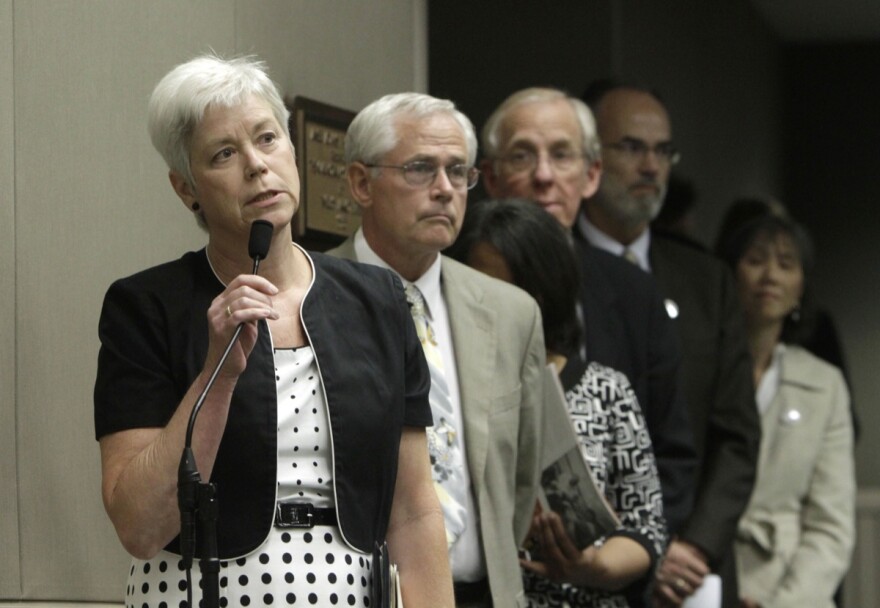This story is free to read because readers choose to support LAist. If you find value in independent local reporting, make a donation to power our newsroom today.
This archival content was originally written for and published on KPCC.org. Keep in mind that links and images may no longer work — and references may be outdated.
OC may adopt 'Laura's Law' following homeless man's death

The July death of a schizophrenic homeless man after an altercation with Fullerton Police has focused attention on care for the mentally ill.
Orange County supervisors might now adopt “Laura’s Law” so clinic workers can go into the streets to treat the mentally ill. Laura’s Law is in effect only in Nevada County, east of Sacramento. Officials there say it’s humane and cost-effective.
A metal detector and a uniformed guard greet visitors at the door of the Nevada County Behavioral Health Department. Security in the otherwise folksy lobby wasn’t always so tight, but 10 years ago, a severely mentally ill patient shot up the department’s front office and a restaurant nearby. He killed three people — among them 19-year-old Laura Wilcox, a mental health clinic volunteer on winter break from college.
"In January of 2001 our daughter was working at the Nevada County behavior health clinic, and she never came home that day," says Nick Wilcox, Laura's father.
Scott Harlan Thorpe was her killer — 41 years old at the time, suffering from severe delusions. He also refused medication to control those delusions. His family and the mental health system couldn’t do anything.
"We came to realize that this rampage shooting was really triggered by deficiencies in the mental health system," Nick Wilcox says. "So not being able to do anything about our daughter because she was dead, we tried to work on correcting the system."
The result? Laura’s Law, which allows counties, if they choose, to require medical treatment for a unique segment of the mentally ill community. It applies only to patients with severe mental illness and a history of multiple hospitalizations or jail time. The law lets a judge order such patients into “assisted outpatient treatment.”
"If we didn’t have assisted outpatient treatment, the only way you can really intervene with seriously mentally ill people who refuse treatment is to wait until something horrible happens," says Michael Heggarty, Nevada County's behavioral health director, "and then you can use involuntarily hospitalization or incarceration. But that’s a terrible outcome to have to wait for."
What’s more, says Heggarty, for every dollar spent on Laura’s Law, Nevada County saves $1.81 because fewer people end up in jail or in a mental hospital. Still, Heggarty says he was skeptical about the need.
"Part of my ignorance at the time was not really understanding fully the number of people that are seriously mentally ill," Heggarty says, "and because of their mental illness ... refuse to be in treatment because they don’t consider themselves to be sick."
Debra understands. She’s the mother of a 30-year-old schizophrenic son. She talked about him but wouldn’t give her last name.
"Truthfully, it’s like living on a roller coaster from hell," Debra says. "When he’s on medications he’s stable and he’s a joy to live with." And when he’s not, verbal and physical aggression overtakes him.
Still, says Debra, her son doesn’t believe he’s sick. She says the court order is the only reason he takes his meds.
An inability to recognize their illness is a trait shared by many of the 32 patients under Laura’s Law care in Nevada County. That’s according to Tom Anderson, the presiding judge of the Nevada County Superior Court.
"I explain to them it’s not a criminal proceeding," Anderson says. "You know, we’re not talking about forcibly committing them. We’re just talking about getting them some services."
And even though the services are court ordered, Laura’s Law doesn’t force anyone to take meds. They agree to care with encouragement from relatives, a doctor, a case manager and sometimes a lawyer.
Judge Anderson oversees it all. "I say, 'here’s the proposed treatment plan. Let’s just break it down and see what it means and what things here are acceptable to you and what aren’t. These are people who want to help and are offering you some services.'"
"If we can do that early on rather then when they ... do something terrible and enter the criminal justice system, that’s better for them, it’s better for communities and certainly would be better for Laura and our family," says Laura's mother, Amanda Wilcox.
Wilcox says she hopes her daughter’s death will end up saving lives. It’s working that way in Nevada County.







